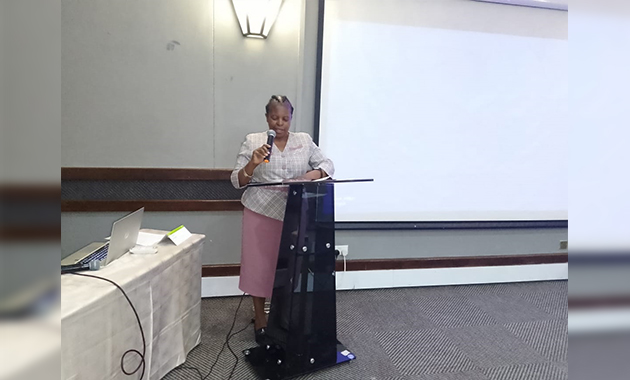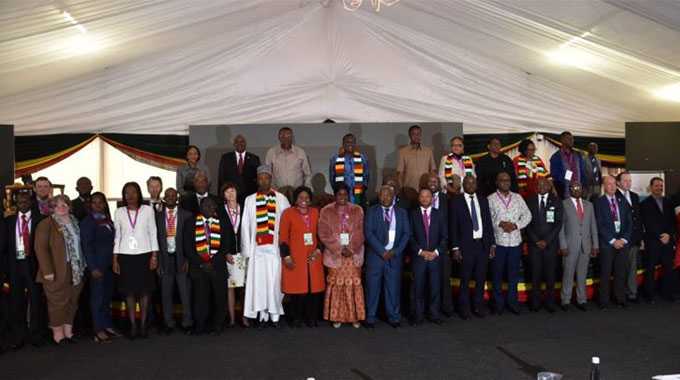Prepaid meters way to go
residents to pay for water in advance, and determine how much they spend on water every month.
The system, which is expected to be running by end of June, comes on the back of similar steps by power utility Zesa, to install prepaid meters for consumers, most of whom are in urban areas.
A prepaid system is one where consumers pay for a service such as electricity or water before actually getting to use it, and is a cheaper option for cash strapped consumers.
Under the system, if implemented, it would see consumers paying for power and water first before using it, in exactly the same manner they do for basic commodities.
This would be different from the traditional billing system for service where people only get to pay for electricity and water after use.
In most cases, it works through a voucher system, where consumers purchase a credit card with a code that they feed into the meters and get credit units commensurate with the fed value.
Failure to buy credit will result in one being automatically disconnected.
The system is most popular in the developed world, and in the region, South Africa is leading the pack.
Prepaid systems are widely used in a variety of industries, but most successfully and commonly in the mobile service industry.
Harare seems to be moving fast, with the initial phase expected to cater for 1 000 apartments mostly in the Avenues area.
The pilot project, if successful, would see the municipality taking it to other suburbs in the city, effectively replacing current meters, something consumers are eagerly waiting for.
Zesa is also on record as saying consultations were in progress to assess possibility of moving to prepaid or smart card metering system to improve revenue collection.
Zesa chief executive, Engineer Josh Chifamba told a Parliamentary Portfolio Committee recently that apart from increasing revenue collection, the system would enable consumers to control consumption.
He said consumers would be aware of how many units they have and hence avoid instances when the bill comes as a shocker.
The prepaid water, electricity and phone system allows authorities to offer a service and also guard against consumers incurring huge bills that they usually fail to settle.
Residents are agreed that although access to water is a basic right, it was critical that the authorities get enough revenue to finance expansion and supply, which currently is less than half the demand.
Harare Water currently produces an average of 600 megalitres a day against a demand of more than 1 200 megalitres.
Zesa is producing around 1 200 megawatts against a peak demand of 2 100 megawatts and, needs to manage demand while also ensuring that people do not abuse power.
Zesa has already started issuing prepaid meters to residents who had properties with such meters before. The meters had been removed after it was discovered that consumers were abusing the facility.
It is also foolproof in that an inactive account would attract a visit by the authorities. Residents seeking prepaid machines can get them at the main ZEDTC offices in Harare, and apply for the meter at no cost.
Consumers however, first need to clear their outstanding accounts before applying and, it takes less than two months for Zesa to approve and install the gadgets, also at no cost.
The machine comes with a credit number that one has to take to Zesa offices to buy electricity units that are in denominations of US$5, US$10, US$20, US$50 and US$100. Ten United States dollars can buy 189 kilowatts which is equivalent to a two-week power supply for a household.
Residents say there is nothing wrong with introducing prepaid meters as long as water and electricity are available when paid in advance.
Mrs Loice Matimba of Mabelreign said it was critical that authorities brought back confidence among residents. She said the “pay after use system” did not encourage consumers to pay, as in most cases service did not match the cost charged at the end of the month.
“This old system has been abused by service providers who are charging exorbitant costs for power or water.
“This is the reason they are in no hurry to start collecting actual meter readings, or correct faulty meters. Both Zesa and the city council are happy with using estimates because they are benefitting.
“The prepaid system should be implemented fast as it means I have control over my electricity and water expenditure, and this prevents me from attracting penalties arising from late bill payments,” she said.
Another consumer, Mr Washington Mabunda said prepaid systems had worked well for mobile phone users and it was most welcome.
“It has been used by mobile phone operators and that has been fantastic. What is happening with NetOne defaulters clearly shows the need to regulate consumers’ spending patterns.
“Water and electricity can also be regulated in the same way with advance payment ensuring that the authorities have enough working capital.
“It gives the consumer a moral right to ask for a better service than what is happening now. Remember, these utilities are always crying that they are owed millions in unpaid bills, thus they cannot offer a reliable service.
“Hopefully, the system will not be used as bait for unjustified increases in price of power and water,” he said.
Prepaid systems are widely used in South Africa and divided into two categories. These include the primary market – where the power utility Eskom or municipalities own and operate meters on properties and the secondary market – where the owner of a property installs a privately owned submeter to the primary meter owned by the utility.
In South Africa, most meters comprise of both vending and metering function in a single device. These meters are operated from a central server that is connected to the GMS network and enable tenants and landlords to manage credit allocation via SMS.
This means when a tenant moves into a property, he or she pays first an amount for electricity; credits this amount into the server system to get a credit token. The tenant then enters the credit token to the meter, and the meter starts to dispense electricity to the value of the token.
“The prepaid meter is likely to solve the problems of defaulting tenants as they will simply not get the power. New tenants will not have problems with landlords as they will have to pay first before using power,” said Mrs Rita Machinga, a tenant in Hatfield.
The greatest advantage for prepaid meters is that consumers pay money as much as consumption, and they can query all unexplained additional costs, which has not been the case in Zimbabwe.
The utility has no payment woes, as defaulters will simply be cut off. For, the utility consumption reports and patterns can be prepared by using a database, hence it will be easy to monitor demand and expenditure of every consumer.
Consumers have fixed price guarantee for power and water and any increases can be anticipated.
This allows consumers to regulate spending and check unnecessary hikes. The service provider is spared from bills following, as consumers are aware of the consequences of nonpayment.
Currently, consumers owe Zesa more than US$450 million, while Harare is owed US$132 million in unpaid bills, and efforts to recover them are hitting a brick wall.
This makes the prepaid system the best option for both consumers and supplies.
[email protected]









Comments